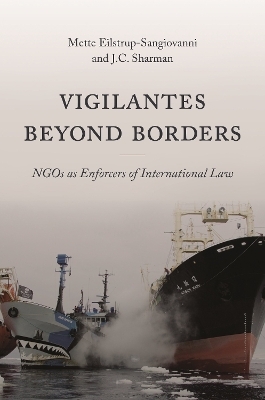
Vigilantes beyond Borders
NGOs as Enforcers of International Law
Seiten
2022
Princeton University Press (Verlag)
978-0-691-23223-2 (ISBN)
Princeton University Press (Verlag)
978-0-691-23223-2 (ISBN)
How and why NGOs are increasingly taking independent and direct action in global law enforcement, from human rights to the environment
Nongovernmental organizations (NGOs) have generally served as advocates and service providers, leaving enforcement to states. Now, NGOs are increasingly acting as private police, prosecutors, and intelligence agencies in enforcing international law. NGOs today can be found investigating and gathering evidence; suing and prosecuting governments, companies, and individuals; and even catching lawbreakers red-handed. Examining this trend, Vigilantes beyond Borders considers why some transnational groups have opted to become enforcers of international law regarding such issues as human rights, the environment, and corruption, while others have not.
Three factors explain the rise of vigilante enforcement: demand, supply, and competition. Governments commit to more international laws, but do a poor job of policing them, leaving a gap and creating demand. Legal and technological changes make it easier for nonstate actors to supply enforcement, as in the instances of NGOs that have standing to use domestic and international courts, or smaller NGOs that employ satellite imagery, big data analysis, and forensic computing. As the growing number of NGOs vie for limited funding and media attention, smaller, more marginal, groups often adopt radical strategies like enforcement.
Looking at the workings of major organizations, including Amnesty International, Greenpeace, and Transparency International, as well as smaller players, such as Global Witness, the Sea Shepherd Conservation Society, and Bellingcat, Vigilantes beyond Borders explores the causes and consequences of a novel, provocative approach to global governance.
Nongovernmental organizations (NGOs) have generally served as advocates and service providers, leaving enforcement to states. Now, NGOs are increasingly acting as private police, prosecutors, and intelligence agencies in enforcing international law. NGOs today can be found investigating and gathering evidence; suing and prosecuting governments, companies, and individuals; and even catching lawbreakers red-handed. Examining this trend, Vigilantes beyond Borders considers why some transnational groups have opted to become enforcers of international law regarding such issues as human rights, the environment, and corruption, while others have not.
Three factors explain the rise of vigilante enforcement: demand, supply, and competition. Governments commit to more international laws, but do a poor job of policing them, leaving a gap and creating demand. Legal and technological changes make it easier for nonstate actors to supply enforcement, as in the instances of NGOs that have standing to use domestic and international courts, or smaller NGOs that employ satellite imagery, big data analysis, and forensic computing. As the growing number of NGOs vie for limited funding and media attention, smaller, more marginal, groups often adopt radical strategies like enforcement.
Looking at the workings of major organizations, including Amnesty International, Greenpeace, and Transparency International, as well as smaller players, such as Global Witness, the Sea Shepherd Conservation Society, and Bellingcat, Vigilantes beyond Borders explores the causes and consequences of a novel, provocative approach to global governance.
Mette Eilstrup-Sangiovanni is professor of international relations at the University of Cambridge, where she is a fellow of Sidney Sussex College. J. C. Sharman is the Sir Patrick Sheehy Professor of International Relations at the University of Cambridge, where he is a fellow of King’s College.
| Erscheinungsdatum | 14.04.2022 |
|---|---|
| Verlagsort | New Jersey |
| Sprache | englisch |
| Maße | 156 x 235 mm |
| Themenwelt | Recht / Steuern ► EU / Internationales Recht |
| Sozialwissenschaften ► Politik / Verwaltung ► Europäische / Internationale Politik | |
| ISBN-10 | 0-691-23223-7 / 0691232237 |
| ISBN-13 | 978-0-691-23223-2 / 9780691232232 |
| Zustand | Neuware |
| Informationen gemäß Produktsicherheitsverordnung (GPSR) | |
| Haben Sie eine Frage zum Produkt? |
Mehr entdecken
aus dem Bereich
aus dem Bereich
Studienbuch
Buch | Hardcover (2023)
De Gruyter Oldenbourg (Verlag)
CHF 62,90
Amerikas Strategie der Vorherrschaft und der Kampf um Eurasien
Buch | Softcover (2024)
NOMEN Verlag
CHF 27,95


